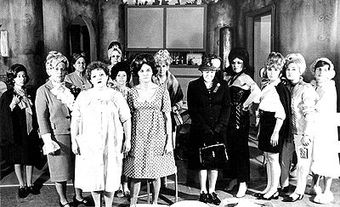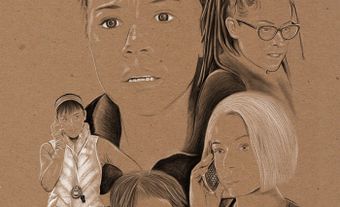
Early Years
Duan Acklom, as Manners was known to his family, was the product of a distinguished and affluent lineage through his British parents. His mother, Lillian Manners, was related to Lady Diana Cooper and the Duke of Rutland, while his father, George Moreby Acklom, had family ties to writers Sir Arthur Conan Doyle, W.H. Homing and Morbey Acklom. Manners’s father was a successful writer who also ran Harrow House, a prestigious Halifax school that prepared students for entry into major British universities such as Oxford and Cambridge.
While still a boy, Duan had two traumatic experiences. When survivors from the Titanic arrived in Halifax in April 1912, the Acklom family took three of them into their home. Manners said years later, “I had nightmares for weeks after hearing their stories and tales from others who came to visit.”
The Ackloms’ house was also badly damaged in the Halifax Explosion on 6 December 1917. Duan suffered a broken arm, and received treatment in an emergency hospital that was set up at his father’s school. Manners later blamed his life-long problems with asthma on the smoke that hung over Halifax in the wake of the disaster.
Education and Early Career
In 1919, Duan enrolled in the University of Toronto to study forestry. He also joined a university drama group that presented plays at Toronto’s Hart House Theatre. He adopted the stage name David Manners (Manners being his mother’s maiden name) because it was easier for audiences to remember than his own name, and fit on posters better.
Manners was only months away from graduation when, in February 1923, he was invited to New York City to join a touring company that would be crossing the United States. Against his father’s wishes, Manners dropped his studies to pursue a career as an actor. A year later, he was on Broadway co-starring with Helen Hayes in the hit show Dancing Mothers. Manners’s performance in that production led to more roles on and Off Broadway.

Acting Career
In 1930, British director James Whale, who had seen Manners on stage in New York, invited him to Hollywood to play a supporting role in the motion picture version of the play Journey’s End. The film was a critical and box-office success, launching Manners’s career as a movie star. His good looks, soft but expressive voice, and sophisticated bearing onscreen caught audiences’ attention. Studio publicists fabricated details of his life to make him seem both more cultured (saying that he graduated from university), and more rugged and exotic (claiming that he once fought off a bear while working as a foreman at an Ontario logging camp). He soon had to hire a secretary to help him with the flood of fan mail.
Manners appeared in nearly 40 feature films, including The Mummy (1932) with Boris Karloff, Roman Scandals (1933) with Eddie Cantor and The Mystery of Edwin Drood (1935) with Claude Rains. Among his female co-stars were such legendary actresses as Loretta Young, Katherine Hepburn, Barbara Stanwyck, Claudette Colbert and Carole Lombard. Manners had the opportunity to showcase his talent as a singer in Crooner (1932). He is perhaps best remembered for his role as John Harker in the 1931 horror classic Dracula, which starred Bela Lugosi.
In 1932 and 1935, Manners was listed among the Top 10 box-office stars in North America and the United Kingdom. However, he abruptly abandoned Hollywood in 1936 and returned to the New York stage, where he performed until he retired from acting in 1950.

Charitable Pursuits
Although Manners turned his back on Hollywood, which he called a “false” place, he used his influence to help promising up-and-coming actors such as Lucille Ball, who had a small role in Roman Scandals, and Marlon Brando, with whom Manners co-starred in the Broadway production of Truckline Café, directed by Elia Kazan. Manners quietly financed small theatrical groups in California and paid medical bills for people in the film industry who had fallen on hard times. Under his birth name, Duan Acklom, he supported anti-drug programs and helped performers overcome addictions.
Personal Life and Other Projects
Manners married Suzanne Bushnell in 1929; they divorced in 1931. He legally changed his name to David Joseph Manners in 1940, the same year he became a naturalized US citizen. Manners’s most significant relationship was with writer William Mercer, with whom he lived from 1948 until Mercer’s death in 1978. For several years Manners lived in quiet seclusion on a ranch at the edge of California’s Mojave Desert. He painted and wrote novels, one of which, Under Running Laughter (1943), was a best-seller.
In 1966, as Duan Acklom, Manners became a founding member of the American Dracula Society. He attended its annual conventions for 30 years. Fellow members were always disappointed that David Manners, the only surviving actor from the cast of the 1931 movie, refused invitations to appear as an honoured guest speaker. They were unaware that Acklom, now in his senior years, was Manners. In a rare interview given in 1996, Manners said, “I loved to see the enthusiasm the society members paid to my 1931 film, but I felt it would destroy the illusion if they saw me as I was then, an old man.”
For most of the latter part of his life, Manners lived in a mansion in Pacific Palisades, California. He had the grounds planted with maple trees because the autumn colours of the leaves reminded him of his childhood in Canada. Failing health forced him to move into a retirement home near Santa Barbara, where he died at the age of 98.

 Share on Facebook
Share on Facebook Share on X
Share on X Share by Email
Share by Email Share on Google Classroom
Share on Google Classroom


